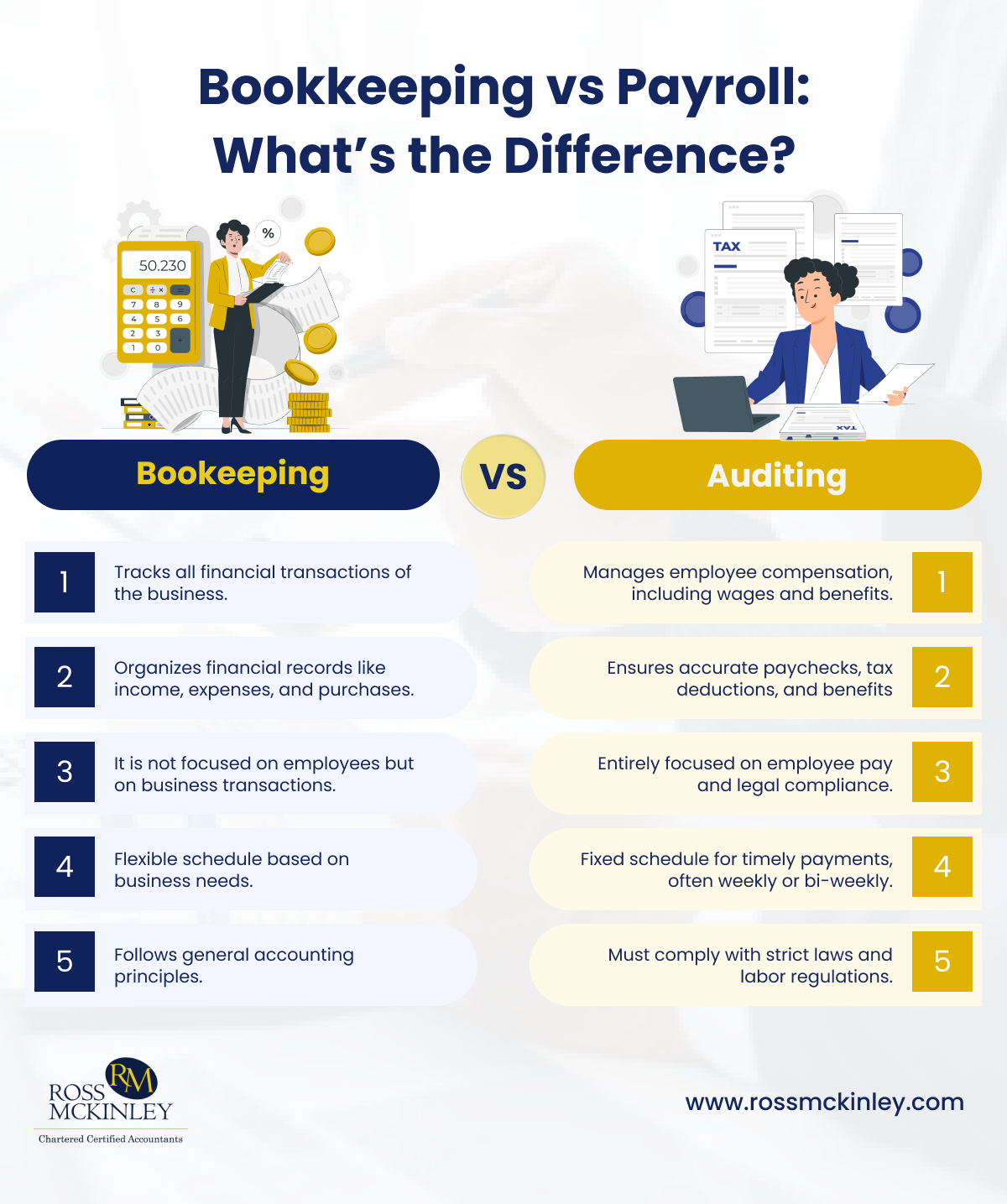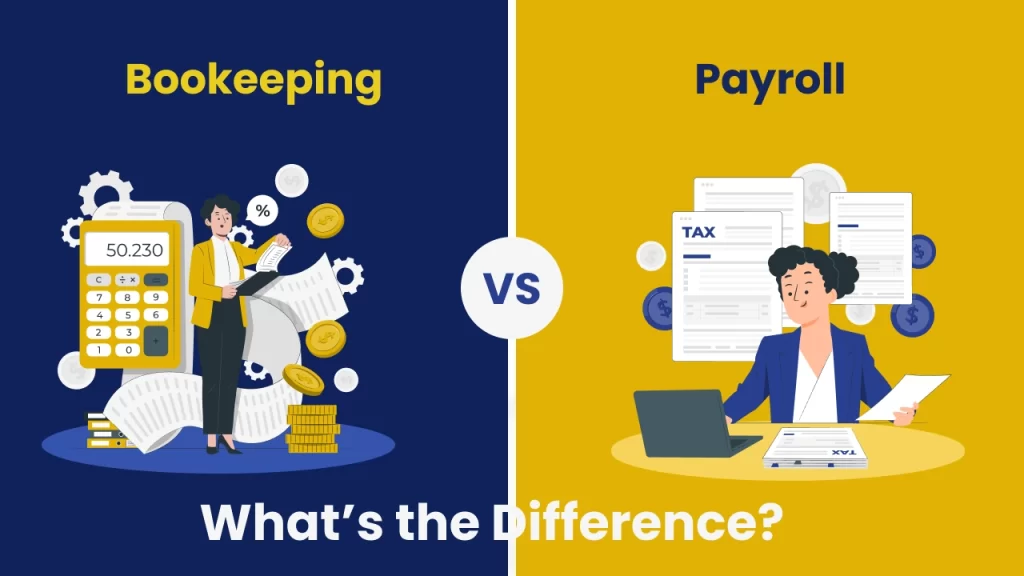Running a business often involves juggling various financial tasks, and terms like bookkeeping and payroll can create confusion. Although they address distinct areas, both are vital components of financial management.
Misunderstanding these processes may lead to inefficiencies or compliance issues, impacting your business’s performance. Can you afford to lose your target audience to your competitors?
Think of bookkeeping and payroll as two pieces of the financial puzzle, each with unique roles and responsibilities. Understanding both can help you manage these tasks effectively and maintain financial stability. Read our latest blog to understand the differences between bookkeeping and payroll and keep your business operations smooth and compliant.

Table of Contents
What Is Bookkeeping?
Bookkeeping is all about tracking your business’s money, including what you make, spend, and owe. It’s the backbone of your financial health, helping you stay organized and aware of your cash flow. When done right, bookkeeping gives you a clear view of your business’s financial status.
A bookkeeper’s job includes balancing bank statements, creating financial reports, and correctly sorting all transactions. From tracking daily expenses to preparing your records for tax time, bookkeeping helps you stay on top of your finances and ensures everything is in order.
Solid bookkeeping allows you to make smarter business decisions, avoid mistakes, and be ready for tax season without stress.
What Is Payroll?
Payroll is about managing employees’ pay, including wages, salaries, bonuses, and deductions. It ensures your team gets paid correctly and on time while handling tax withholdings, benefits, and other legal deductions.
Getting payroll right is essential for keeping employees happy and staying on the right side of the law. It takes careful calculations and attention to tax rules to avoid legal problems. Payroll isn’t just about handing out paychecks; it also includes creating reports for tax filings and managing benefits.
For example, accurate payroll helps make year-end tax filings easier and prevents mistake penalties.
Differences Between Bookkeeping vs Payroll
Understanding the differences between bookkeeping and payroll can help you manage your business finances better. While both handle money, bookkeeping tracks all financial transactions, and payroll focuses on employee compensation.
Here are the key differences between bookkeeping vs payroll:
| Bookkeeping | Payroll |
| Tracks all financial transactions of the business. | Manages employee compensation, including wages and benefits. |
| Organizes financial records like income, expenses, and purchases. | Ensures accurate paychecks, tax deductions, and benefits. |
| It is not focused on employees but on business transactions. | Entirely focused on employee pay and legal compliance. |
| Flexible schedule based on business needs. | Fixed schedule for timely payments, often weekly or bi-weekly. |
| Follows general accounting principles. | Must comply with strict laws and labor regulations. |
Primary Function
The main job of bookkeeping is to keep track of all a business’s financial transactions. It includes income, expenses, sales, and purchases, giving you a complete picture of your business’s financial health.
For example, a bookkeeper might record a client’s payment and note it as revenue.
Payroll, on the other hand, focuses on how employees get paid. It includes correctly calculating wages, handling bonuses, and deducting taxes or benefits. For example, payroll ensures an employee’s paycheck is accurate and follows legal rules.
While bookkeeping focuses on the business’s finances, payroll specifically manages employee compensation, tax deductions, and benefits accurately and on time.
Scope of Financial Management
Bookkeeping covers a wide range of financial tasks. It keeps track of all the money coming in and going out, including accounts payable and receivable. Moreover, you can use it as a business owner to create financial statements and understand your performance.
For example, bookkeeping allows businesses to make balance sheets and profit-and-loss reports.
Payroll, on the other hand, focuses specifically on employee payments. It handles salaries, benefits, and taxes correctly and ensures that all the necessary tax filings and legal rules are followed.
For example, payroll calculates withholdings and benefits for each employee.
Relation to Employees
Bookkeeping isn’t focused on employees. Its main job is to keep track of all business finances, such as transactions with customers, vendors, and internal operations.
For example, bookkeeping might handle payments to vendors or customer invoices, but it doesn’t manage employee wages, which is the job of payroll.
Payroll, on the other hand, is all about employees. It calculates wages, distributes paychecks, manages benefits, and ensures that taxes are done correctly. Without payroll, businesses could face unhappy employees and legal problems from unpaid or incorrect pay. Employees rely on payroll for accurate pay, timely benefits, and proper tax filings.
Frequency of Tasks
Bookkeeping tasks happen regularly but aren’t tied to a strict schedule. For example, recording transactions or balancing accounts can be done daily, weekly, or monthly, depending on how often the business needs them. This flexibility lets businesses adjust bookkeeping based on the number of transactions.
Conversely, payroll follows a weekly, bi-weekly, or monthly schedule. It ensures employees get paid on time and helps businesses meet tax deadlines. If a payroll cycle is missed, it can lead to legal issues and unhappy employees. A set payroll schedule builds trust with employees by making sure paychecks come on time.
Compliance and Legalities
Bookkeeping follows general accounting principles, and while it’s essential to stay compliant, the rules are not as strict as payroll. For example, if expenses are miscategorized, it might cause financial confusion, but it usually won’t lead to legal issues.
Payroll, however, has to follow strict rules related to employment laws, taxes, and benefits. Mistakes in payroll, like wrong tax deductions, can cause serious legal problems. For example, not following payroll tax laws could lead to audits or fines for the business.
How Can Ross Mckinley Help You With Bookkeeping and Payroll?
When it comes to bookkeeping vs payroll, both are essential for smooth financial management. Bookkeeping keeps track of your business’s financial records, helping you understand your financial standing.
On the other hand, payroll ensures your employees are compensated accurately and on time, maintaining trust and satisfaction.
At Ross Mckinley, we help businesses of all sizes manage bookkeeping or payroll effectively. Our tailored solutions ensure accuracy, compliance, and efficiency, whether you need help organizing financial records or managing employee payments. Let us handle the complexities of bookkeeping and payroll so you can focus on growing your business.

